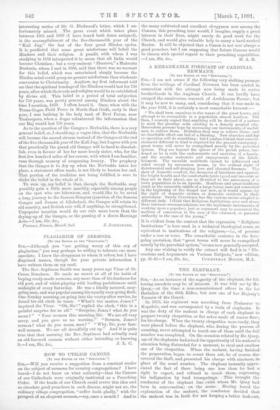A REMARKABLE FORECAST OF CARDINAL NEWMAN'S. ITo TEE EDITOR OF
TEE " SPECTATOR."] am not aware if the following very striking passage• from the writings of Cardinal Newman has been quoted in. connection with the attempt- now being made to revive- brotherhoods in the Anglican Church. It can hardly have escaped the omnivorous research of Archdeacon Farrar ; but, it may be new to many, and, considering that it was made in. the year 1836, it is certainly a most remarkable forecast :— .
" We shall turn ourselves to the wants of the great towns, and attempt to be evangelists in a population almost heathen. Till then, I scarcely expect that anything will be devised of a nature to meet the peculiar evils existing in a densely peopled city._ Benevolent persons hope by increasing our instruments of useful- ness to relieve them. Doubtless they may so relieve them; and no charitable effort can fail of a blessing. New churches and lay co-operation will do something; but I confess I think that sonic in- strument different in kind is required for the present emergency :- great towns will never be evangelised merely by the parochial system. They are beyond the sphere of the parish priest, bur- dened as ho is with the endearments and anxieties of a family,. and the secular restraints and engagements of the Estab- lishment. The unstable multitude cannot be influenced and ruled except by uncommon means, by the evident .sight of - disinterested and self-denying love and elevated firmness. The show of domestic comfort, the decencies of furniture and apparel, the bright hearth and the comfortable table (good and innocent as . they are in their place), are as ill-suited to the missionary of a town population as to an Apostle. Heathens and quasi-heathens (such as the miserable rabble of a large town) were not converted in the beginning of the Gospel nor now, as it would appear, by the sight of domestic virtues or domestic comforts in their • missionary. Surely Providence has His various means adapted to different ends. I think that Religious Institutions over and above their intrinsic recommendations are the legitimate instruments of working upon a populace, just as argument may be accounted the medium of conversion in the case of the educated, or parental authority in the case of the young."
It is evident from the context that the expression "Religious. Institutions " is here used in a technical theological sense, as. equivalent to institutions of the religious,—i.e., of persons . under a vow or vows. The remarkable sentence in the fore- going quotation, that "great towns will never be evangelised merely by the parochial system," seems now generally accepted.. Any one wishing to verify the extract will find it in " Dis- cussions and Arguments on Various Subjects," new edition,..






































 Previous page
Previous page